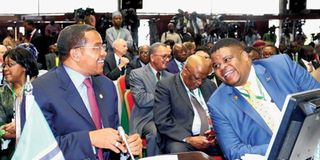Police to join hands in war on crime

President Jakaya Kikwete of Tanzania (left) with other delegates and presidents during the AU Peace and Security Council at KICC, Nairobi, on September 2, 2014. PHOTO | BILLY MUTAI |
What you need to know:
- The police bosses spent time discussing how to combat trans-national crimes.
- The biggest challenge presented was radicalization.
Chief of police forces in the region met last week, ahead of a gathering of African Union heads of state in Nairobi on Tuesday.
And like the heads of state and another meeting of intelligence chiefs, the police bosses spent time discussing how to combat trans-national crimes.
The Eastern Africa Police Chiefs Cooperation Organisation’s (Eapcco) meeting in Mombasa proposed measures that will include having the forces collaborate without engaging in “unnecessary bureaucratic processes which only play to the advantage of criminals.”
Participants from 17 countries held seven separate sessions and made proposals on combating crime across the borders.
Inspector-General of Police David Kimaiyo took over the chairmanship of Eapcco from his Seychelles counterpart.
He said: “Through this cooperation we have ensured that the operating field for criminals who commit crimes in one country and run to seek refuge in another is narrowed.”
DEFY BORDERS
Mr Kimaiyo noted that they were also able to interdict and thwart numerous terrorist attempts in the region.
In particular, the police chiefs discussed crimes that defy borders including terrorism, drug trafficking, money laundering, environmental crimes and maritime piracy.
Mr Kimaiyo also noted: “(The) criminals we are dealing with today and especially terrorists and organised gangs are always very quick in taking advantage of new technologies which enable them avoid and penetrate critical security infrastructure.”
But the biggest challenge presented was radicalization.
One of the papers said: “Africa has in the recent past been experiencing radicalization and brain washing of the youth to join terrorist groups motivated by false promises in a deliberate misinterpretation of religious teachings.”
Mr Kimaiyo added: “Whatever is happening in the Middle East could easily spill over to our region through sympathizers, and this calls for extra vigilance on our part.”




